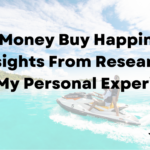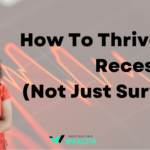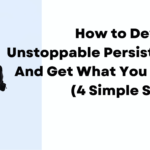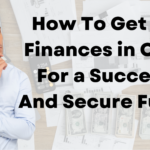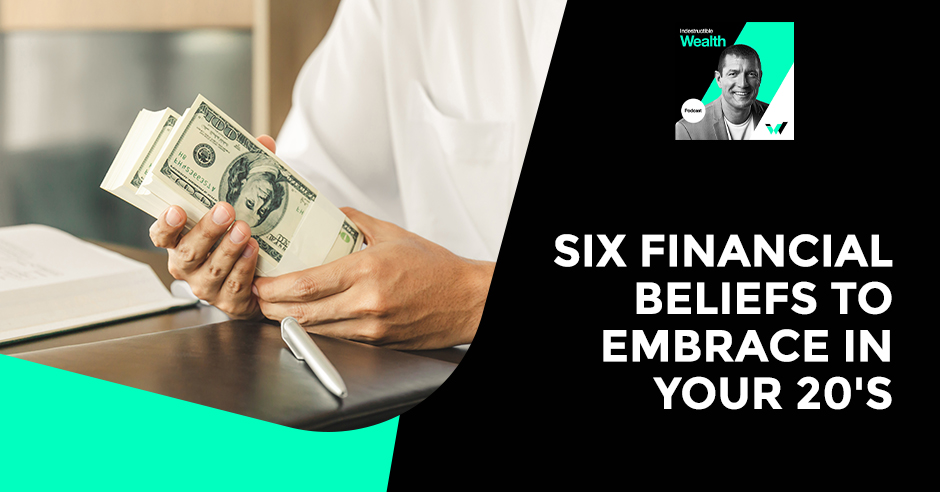
… And some to avoid 😉 In this episode, I take a deep dive into what I could have done in my 20’s to set myself up better financially, and avoided a lot of stress. Learn from my mistakes!
—
Table of Contents
Listen to the podcast here
Six Financial Beliefs To Embrace In Your 20’s
If you could go back in time and give yourself financial advice, what would you say? My followers know I’ve had many struggles to build wealth over the years. Those struggles led to me wanting to create this platform to teach essentially my younger self how to avoid those types of mistakes that I made. I bought stocks because of fear of missing out and a lack of education only to see them crash and wipe out half of my hard-earned college years hustle-type cash.
I’ve invested in real estate with the wrong people and ended up spending a ton of time, energy, and stress digging my way out. I’ve taken too many things on and crashed my energy levels essentially crashing my adrenals. I bought stocks to see them get shorted by greedy hedge fund players. I’ve also done a lot of things right. Not all of the things I’ve done a bit wrong or I wouldn’t be in the position that I’m in now.
It’s only because of the skills I learned as a result of those experiences that I was able to put myself in the financial position that I find myself in now. In this episode, I reflect on the things I wish I’d known or maybe wish I’d done that I was told to do that I ignored about the money back in my twenties. We’re going to talk about whether or not they would’ve led me to where I am now or even beyond.
Take Risks
The first thing I want to talk to you about, the first point is to take risks with starting businesses, but protect your starting capital when you invest. As you know, if you followed my platform for any length of time, there’s a central theme that I keep impressing upon you. Building net worth and wealth is done fastest inside of your own company. If you’re an employee, I firmly believe that in order to get to a point where you can retire young financially free, you want to have a side business or a side hustle.
The younger that you start, the more time compounds your business growth. There’s a lot of talk about the magic of compounding money being the eighth wonder of the world, but even more impactful in my experience is the magic of time compounding the growth of your business. If you’re taking enough smart risk where you’re strategic and you’ve planned it out, and you believe that the odds are in your favor.
To get to a point where you can retire young financially free, you want to have a side business or a side hustle. The younger that you start, the more time compounds your business growth. Share on XThey are never 100% in your favor, but the odds, even at 51% in your favor, I like it more at around the 80% to 90% range when I start a business, but the chances are you only need one of those risks to pay off to make up for those that don’t work out. You’re going to be much better off with that one success than if you held back from taking a risk at all. You can recover from bad investments. I certainly have, but you’re never going to win back invaluable missed opportunities.
Money can always be replenished, but time cannot, so follow your instincts and follow your gut. When I got started back in 1997 in the direct sales business industry, at that time, even now, it’s still a bit polarizing in terms of there’s still controversy. Some people love the industry and some people, there are hate groups that despise it for whatever reason. I still haven’t figured it out. I believe that it’s a lack of understanding. At any rate, I know that in the direct sales business, there are also certain companies that don’t operate or people that don’t operate at the level of integrity that so many of us inside of the business does.
There is a much more controversial and polarizing business model back then than it is even now. I had to take the risk of getting started in a business that was pretty young at the time, and there were a lot of unknowns. I was essentially at that time living on a prayer. There was nobody my age that was having success or that was building a business when I was at age 22 when I started, but I took the risk because I could see the future, and I believed that this was an industry in nutrition that was going to explode and I could see the demand was ever increasing.
I took a risk and the risk was also social in nature. It was taking a risk that I was going to get ridiculed and made fun of, which I did quite often. All the way through college and even beyond, there were other kids my age that certainly made plenty of jokes, made fun of me, and laughed at me. They thought it was stupid and a complete joke. Success is the best revenge. I think that it’s important to make sure that you’re operating with the core desire to build an incredible future and build your financial independence rather than trying to fit in with the rest of your friends and people your age. I can tell you, that still hasn’t changed to this day.
I don’t see a lot of young people branching off, daring to be different and do something that goes against the grain. I don’t know if that will ever change. There’s always going to be a small percentage of people that are the type that is willing to strike out, do something different, and move against what everybody else does. That’s where success lies. It’s when you’re doing things that other people and the masses aren’t doing. That’s where you’re going to find the most success.

Six Financial Beliefs: Success lies when you’re doing things that other people aren’t doing. That’s where you will find the most success.
When I say to protect your starting capital when you invest, I took a risk in starting the business. It took a year or so to get some traction before it started to make some money. As I accumulated, saved, scrimped, hustled and saved some more, and I had that initial $50,000 in cash, I got way too risky and speculative in nature with that money. I put it all into tech stocks and as you know, the 2000 dot-com bubble burst my money along with it.
Embrace Compounding Interest
I wish I had been more protective of that initial capital. That’s what the wealthy do. They think of safety first. If I had put that money into safer streams of things that I understood, let’s say for investments that created additional streams of cashflow instead of going for a home run right out of the gate. Point number two is to embrace compounding interest. To balance out those risks that you’re taking, plan on taking advantage of the power of compounding interest.
The average return on a simple index fund is around 8%. If you put $5,000 away when you’re eighteen years old without touching it, it’ll be around $10,000 at age 25. That same $5,000 would turn into probably over $250,000 to $300,000 by the time you’re 60 years old without even adding anything more to it. Imagine what would happen if you kept making regular contributions. The power of compounding interest has to be a part of your wealth plan.
When I was back in college and I was starting to make some money, my economics professor, and it was a really special relationship that we had. He was not only my professor but he was a friend. We would go golfing together during the summer when I was still staying there taking summer classes and working my business year around. We played basketball together. We were on the same church league team in the community. We had a sarcastic relationship.
I asked him about investing because I was just starting to get some money. One of the things he told me is that no matter what happens in the market, every single month, he takes a certain percentage of his salary and he buys the stock. He buys a broader market index fund. For example, at that time, I think he was doing the S&P 500. He said, “Every single month, I continued to buy because I can’t time the market and I’m taking advantage of dollar cost averaging.
Over the course of time, he said, “I don’t care if the market drops by 50%. The month that it does that, I’m still going to buy the same fixed amount that I’ve allocated towards that plan. He did that over and over and again every single month. He gave me that wisdom and I did not take advantage of it. Instead, I waited. I saved up a large sum. I lumped the sum and put it into the market, and then when the market dropped, I stopped investing. In fact, I sold out.
That was absolutely an example of me not being teachable. I was probably twenty years old at the time. I was just getting going to make some money. I had some extra cashflow and I didn’t listen. If I had listened to that advice, I’d have an additional probably a couple of extra million dollars by this point. I think that should be a part of your plan, the dollar cost averaging. Taking a fixed amount every month. It doesn’t have to be a huge amount but put that in, follow the economics professor’s advice, and sink it in every month. No matter what happens, if the market goes up or the market goes down, you don’t care because, over the course of time, that’s going to increase your wealth by a drastic amount.
I’m sure that if I were to reach out to him, we lost touch, with that advice, I would imagine that he is stacking up some sizable net worth. Even though he is an employee and a professor, he did well. I recommend everybody does that as employees. You need to have equity in other people’s businesses because the only way to truly grow significant wealth is to have equity. Whether you own your own business or you own other people’s businesses, that’s certainly a huge component of retiring young and rich.
Your Biggest Liability
I would imagine that he probably has enough money now based on what I know of him. That was twenty years ago when he started that plan. I think he’s doing okay. He could probably financially retire anytime he wants. Point number three, there are six points here, by the way. Your home is your biggest liability. I know that there’s still some controversy to this one. There are some people that simply don’t want to embrace and don’t want to buy into it because their homes have gone up in value.
Talked to the people though in 2008 and ask them if their home was their biggest asset. I can guarantee you, anybody who owned a home in 2008, when the market tanked, its values dropped. They found out how much of a liability their home was. Don’t get me wrong. I’m not saying don’t go out and buy a home. If that’s your plan and that’s what you feel you want to do. You want to settle into a home. You don’t want to rent an apartment. You don’t want to rent a home anywhere. If you want to have a place that you can call your own, I get that.
I’m a homeowner. I value having a home but don’t fall for the trap of rushing out to buy a home as soon as possible and don’t think of it as an investment. It’s simply not an investment. It’s a home. What is an asset? An asset is something that pays you positive cashflow typically on a monthly basis. What’s a liability? It’s something that costs you, typically, negative cashflow on a monthly basis. I look at our home and this is our dream home. We love it here. We’re so happy. We love everything about this home. This is the home that we would’ve designed and built, pretty close.
Don't fall for the trap of rushing out to buy a home as soon as possible. Don't think of it as an investment. It's not an investment; it's a home. Share on XWhen I look at how many things cost us money in this house, it’s insane. Things break all the time in this house. Things need to be upgraded. Carrie’s pitching me on getting a new dishwasher. “No problem, honey. You’re my queen. You can get a new dishwasher.” We had to get a new microwave not too long ago. Refrigerators break. We have more service calls to the company, Diamond Factory Appliance. I think we single-handedly keep them in business. They are out here it seems like once a month and they charge $100 just to show up, I think it’s maybe more now.
Things break, things go out, and things need to be repaired. There are taxes that you have to pay. There’s the note and the interest rate. There’s the principal that you’re paying on which does increase your net worth. That is the part about homeownership that is good when you’re paying down or amortizing the loan down on your home. Overall, I’m on my third home and I have yet to have a home of the first two that generated a positive return on investment.
Your Greatest Asset
Point number four, relationship capital is your greatest asset. Money is great when you have it, but when you don’t, relationships are what matter most. Even when you do have it, your network can introduce you to investments and things that can grow your money like nothing else. I’m thinking about a vacation that we were on to Cabo about years ago. That’s when I got introduced to and met Sean, who I invest in self-storage with. It was that relationship that was formed that has made me a ton of money in self-storage.
Those relationships can help you start a new business if things go south. They can help you get back on your feet. For example, I’m looking to buy crypto mining machines from a guy in China. I’m trying to buy these crypto mining machines because they’re an incredible price there compared to what I could buy them for in the US. I called three people and asked them all how they thought I could pay for these, but get these out of the country safely so that this guy wasn’t able to take my money. They all gave me some great ideas.
Tapping those relationships for questions and ideas about things that you would never think that I would’ve called them for those types of questions, but here it is. It came up. What did I do? I got out the Rolodex. I made calls to people that had some expertise in an area specifically doing business with people in China that I had never had before.
Having the right people in your life is worth more than any amount of money. I would trade all of my money, every dollar, and then some for the quality positive people and relationships that are in my life. The relationship that I have with my wife is incredible. It gives me so much joy. We have an awesome marriage. We laugh together. We’re there for each other. I trade all my money in a heartbeat to be able to keep that relationship with her.
The rich build networks and everyone else looks for work. In my direct sales business, which is one stream of income out of a lot of streams. I think I counted sixteen streams of income, which is too many. I’m going to have an episode coming up where I talk about multiple streams of income versus multiple streams of distraction.
I’m going to teach you guys more about how to diversify, and how to create additional streams of income without draining you and distracting your energy. The people who move the fastest in the business, typically, but not always, have the most relationships when they start with people that know, like and trust them. When I first got started at age nineteen, I hadn’t built up a lot of relationship capital at that point. I had some college and high school friends. I used to know some of my parent’s friends, but I didn’t have that know, like and trust type factor with a lot of people.
It took me a solid year to get any traction in that business. There are other people like Lisa who came out of the gate cranking because she had been in the community for a long time. She knew a lot of people. She was very well-liked and trusted. She got started and went crazy. She cranked her business. Why? She had relationship capital.
Multiple Income Streams Are Crucial
Number five, multiple income streams are crucial, but make sure they aren’t MSDs. What’s an MSD? It’s not something that you wish you hadn’t caught by hooking up with somebody of the opposite sex. MSDs are multiple streams of distraction. No matter what you’re doing today to make money, nothing lasts forever. You can’t count on one income stream forever. You can build a business. You can build something that can sustain.
You can build something that you think is going to last forever. Although I believe that some of the income streams that I have and the businesses that I’ve built will be here another decade, 2 decades or 3 decades from now, the fact is I don’t have perfect information. I can’t see the future. I don’t know what challenges, market changes, or forces that are going to come my way. I can’t count on one stream or I’m relying upon and putting myself in a compromised position.
Focus on multiple sources, especially passive additional streams of income, and make sure at least one of them is directly under your control. Now control is somewhat of an illusion. When we think we have control, we can find out that we didn’t but be assured that if one source goes away, even your largest, you would not be forced to change your lifestyle.

Six Financial Beliefs: Control is somewhat of an illusion. Even when we think we have control, we can find out that we don’t. Be assured that if one source goes away, even your most prominent, you will not be forced to change your lifestyle.
That’s why I’m so adamant and the central theme of my platform is creating multiple streams of passive income that protect you from anything that could go wrong. If one dries up, you got all these others that keep coming in and you don’t have to downgrade your lifestyle. You don’t have to live off rice and beans and ramen noodles. You can continue to live the life that you were living before uninterrupted.
When I talk about multiple streams of income, I look at when I got started in real estate investing, I had no idea what a distraction it would be from my other primary business. I started into it as a passive income stream, but as I’ve said before, single-family rentals and single-family homes where you’re renting are another business. It’s not so much exactly a passive stream of income.
You can set it up to where it takes minimal time but still, no matter what, you’re always going to have tenants, toilets and trash, and even with great management in place and having good quality renters, There are always things in a home that are going to go wrong or with tenants that are going to go wrong. With outside forces, even vandalism and the city with high weeds and grass notices for your property, the things are going to come to the attention that is going to distract you and chip away at some of your energy.
I recommend focusing on one thing that you have under your control, and then trying the rest of your streams of income to try to get them as passive as you possibly can. I’m not saying not to buy single-family rentals. That has been a great way that I’ve grown wealth. I’m just saying, be cautious and careful. Know what you’re going into ahead of time. Streams of distraction can be a detriment to your growing of wealth if it takes you away from growing more money in your primary strength core line of business.
Your Greatest Overhead
Number six, ego is your greatest overhead. Nothing is going to cost you more in life than your ego. Not bad investments, not missed opportunities, nothing. The ego is the biggest reason. Most people don’t follow these six rules. Ego is why I didn’t follow my professor’s rule of investing when he presented it to me. I thought I knew better. I thought I could get there faster. I thought that I simply knew more. It causes you to tank relationships, spend money frivolously instead of investing it, and put all your money into one basket as I did when I put all that $50,000 into tech stocks and worse.
It causes you to do what is more costly than anything else, I have to say, it causes you to want to look good. What do I mean by that? Everything that we do as humans were motivated by central themes. One of those main themes is that we want to appear good or look good to get respect from our fellow humans. The number one need for a man, many of you, especially women would probably think is sex, but it’s not that. The number one need of a man is respect.
Many think the number one need for a man is sex, but it's not. The only need for a man is respect. Share on XThink about that for a second. Guys who are reading this, your number one need to fulfill is you want to be respected. In order to get respect, you want to look good. In order to look good, you go out and you think that spending money, even money that you don’t have, a.k.a. sacrificing your future for the present by buying things on credit and buying liabilities that you don’t need, you want to look good.
For me, that was evident when at age 22, I already had a pretty nice car. It still drove well. It was a black sports car, a Dodge Avenger. It was about four years old and it was still in good condition. It still drove just fine but for some reason, I thought that I needed to go out and get a brand-new BMW. I had to have my mom co-sign the loan. That tells you something because I hadn’t established credit yet.
Even though I was making pretty decent money at the time, it wasn’t enough to justify a brand-new car, a BMW with a high payment every month. On top of that is additional high insurance and on top of that, I kept my other car because the BMW was on a lease and I could only hit so many miles per year before I’d pay a pretty hefty fine so to speak for going over so I kept my other car. I had two cars at age 22. Why did I need two cars? I didn’t need two cars, but I wanted to look good.
I had a coaching call with a gal. She and her husband are great people. They make great money, but they spend $2,300 a month just on their car payment. That doesn’t include all the other stuff like the insurance, the maintenance, and the taxes that you got to pay, gasoline. They didn’t factor in all that other stuff. They probably got $3,000 a month going out just in cars.
That’s insane, but why would they do that? It’s because they’re at a certain level of business and they think that they have to have those cars to match up with their level of business that they’re at, which is, a.k.a. they want to look good instead of having the satisfaction and the peace of growing wealth and growing a bank account, creating security, creating independence, and having less stress.
You’re never going to be stressed free in your finances, let me tell you, but you can be at a much lower level of stress because of the decisions that you make in avoiding purchasing decisions based on your ego. What does ego stand for? Edging God Out. It’s wanting to put yourself first and how you look in terms of your relationship with other people.
I wish I could go back and teach myself these principles and have this conversation that I’m having with you guys now, but it may be a little bit late for me to go back in time to when I’m twenty, but guess what? I’m still young, just like you are. You’re still young. Whatever age you’re reading this, you’re still young. You got a lot of time left, so it’s never too late. Start now and set yourself up for long-term financial success by avoiding some of these real-life pitfalls.

